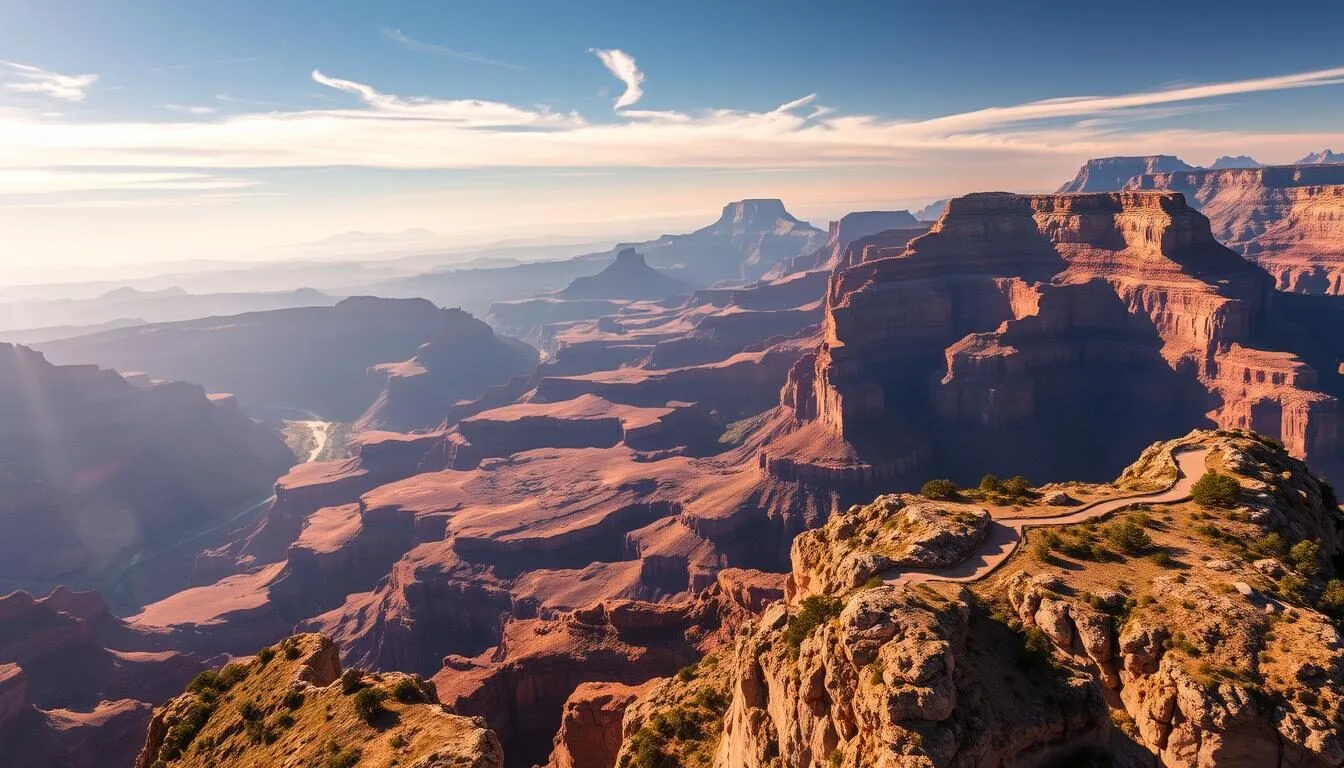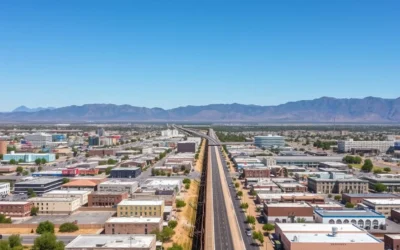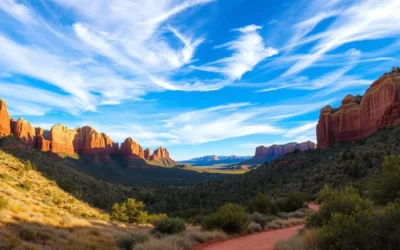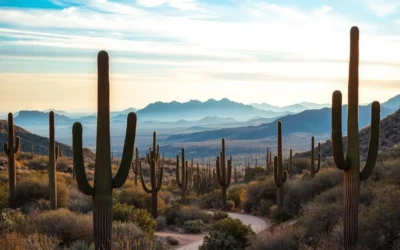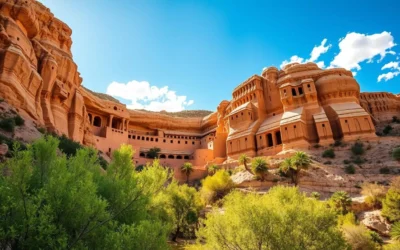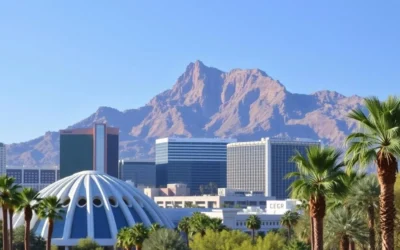Imagine standing at the edge of one of the world’s most iconic natural wonders, the Grand Canyon, with the vast expanse of Arizona’s breathtaking landscape stretching out before you. With its unique blend of rugged desert beauty, lush forests, and deep canyons, Arizona is a paradise for travelers seeking adventure and unforgettable experiences. Whether you’re planning a week-long road trip or a quick weekend getaway, Arizona has something for everyone.
From hiking among red rocks to exploring ancient Native American sites, your bucket list is sure to get a boost in the Grand Canyon State. With numerous places to visit, including the majestic Grand Canyon National Park, you’ll be spoiled for choice. Get ready to create lifelong memories in this incredible state.
Discovering Arizona’s Natural Beauty
The Grand Canyon State is a treasure trove of natural beauty, offering something for every kind of traveler. As you explore Arizona, you’ll discover a diverse range of landscapes that are as breathtaking as they are varied.
Diverse Landscapes
Arizona’s landscape diversity is truly remarkable, featuring the iconic Sonoran Desert with its majestic saguaro cacti, alpine forests in the north, and everything in between. The state is home to three national parks – Grand Canyon, Saguaro, and Petrified Forest – along with numerous national monuments and recreation areas that showcase the American Southwest’s natural splendor.
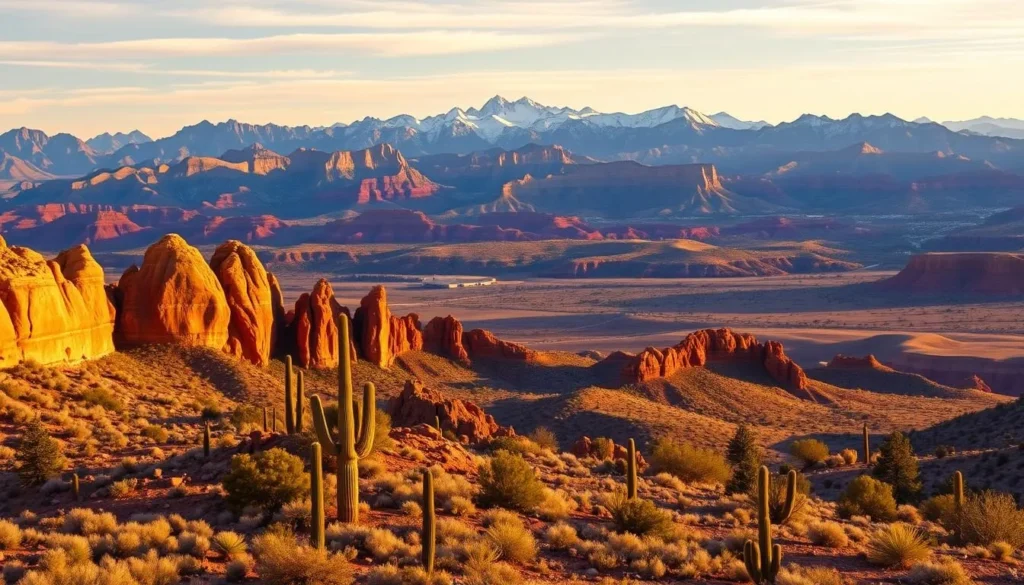
Best Seasons to Visit
Arizona is a year-round destination, but each season brings its unique advantages. Spring (March to June) and fall (September to December) are considered ideal times to visit due to the milder climate. During spring, you can witness the wildflowers blooming, including the state flower, the saguaro cactus with its gorgeous white blossoms.
| Season | Weather Conditions | Activities |
|---|---|---|
| Spring (March to June) | Mild temperatures, wildflower blooms | Explore national parks, hiking, and sightseeing |
| Summer (June to September) | Extreme heat in desert regions | Early morning or evening activities, water sports |
| Fall (September to December) | Comfortable temperatures, stunning foliage | Hiking, exploring northern Arizona’s White Mountains |
| Winter (December to March) | Mild winters, potential snow in high desert areas | Visit Sedona, explore lower elevation areas |
Understanding the best time to visit Arizona can enhance your experience, allowing you to make the most of your trip whether you’re interested in hiking, sightseeing, or simply enjoying the natural beauty of the state.
The Grand Canyon: Arizona’s Crown Jewel
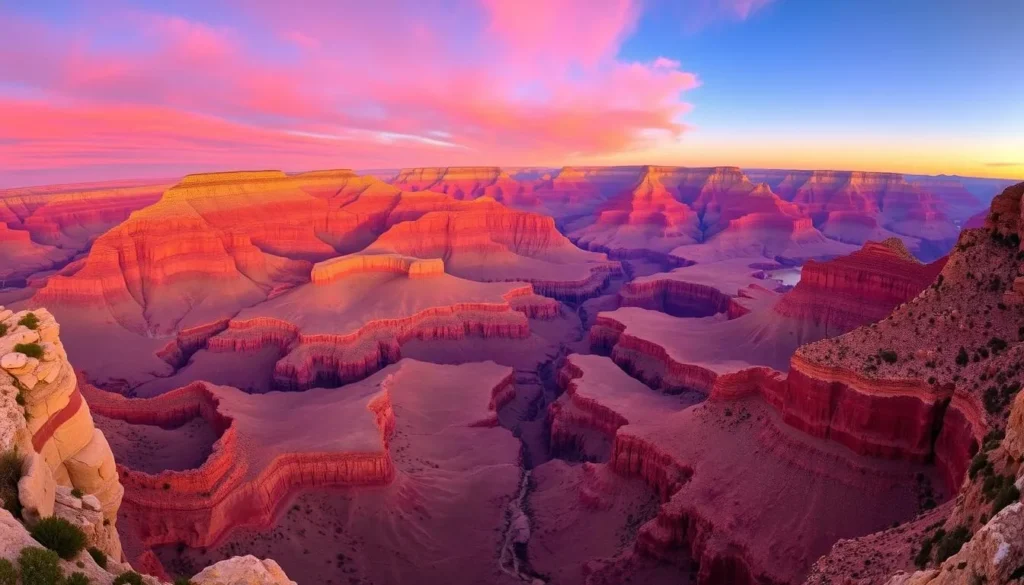
As one of the world’s most spectacular natural wonders, the Grand Canyon stands tall in Arizona’s landscape. The Grand Canyon, carved by the mighty Colorado River over millions of years, stretches 277 miles long, up to 18 miles wide, and reaches depths of over a mile, making it one of the world’s most spectacular natural wonders.
South Rim vs. North Rim: Which to Choose
When planning your visit to Grand Canyon National Park, you’ll need to choose between the South Rim and the North Rim. The South Rim is open year-round and offers more services and viewpoints, making it the more accessible side of the canyon. In contrast, the North Rim is less crowded but has fewer facilities and is only open to visitors from May to October.
Best Viewpoints for Unforgettable Sunsets
For unforgettable sunset views, head to popular viewpoints like Mather Point, Hopi Point, or Yavapai Point. Arriving early is crucial to secure a good spot, as these areas fill quickly during peak times. Watching the colors in the canyon change with the sunlight is a breathtaking experience, even in winter.
Hiking Options for All Skill Levels
The Grand Canyon offers hiking options for all fitness levels. You can choose from the accessible Rim Trail, a 12-mile mostly flat and paved path, to the challenging Rim-to-Rim trek, which is 24 miles one-way and typically completed over 2-3 days. Moderate hikes include the South Kaibab Trail to Ooh-Aah Point and portions of the Bright Angel Trail, both offering spectacular views.
- The Rim Trail runs for 12 miles along the South Rim and is mostly flat and paved.
- The South Kaibab Trail is an easier 1.8-mile hike down to Ooh-Aah Point.
- The Bright Angel Trail is a 9.2-mile strenuous day hike down into the canyon.
- The Rim-to-Rim hike is 24 miles one-way and usually takes 2-3 days to complete.
Remember, hiking into the canyon is always easier than hiking back out, so be sure to bring plenty of water and know your limits.
Sedona’s Red Rock Country
Nestled in Arizona, Sedona’s red rock formations create a visually striking landscape that captivates visitors. This natural beauty, combined with its tranquil atmosphere, makes Sedona an ideal destination for those seeking a mix of adventure and relaxation.
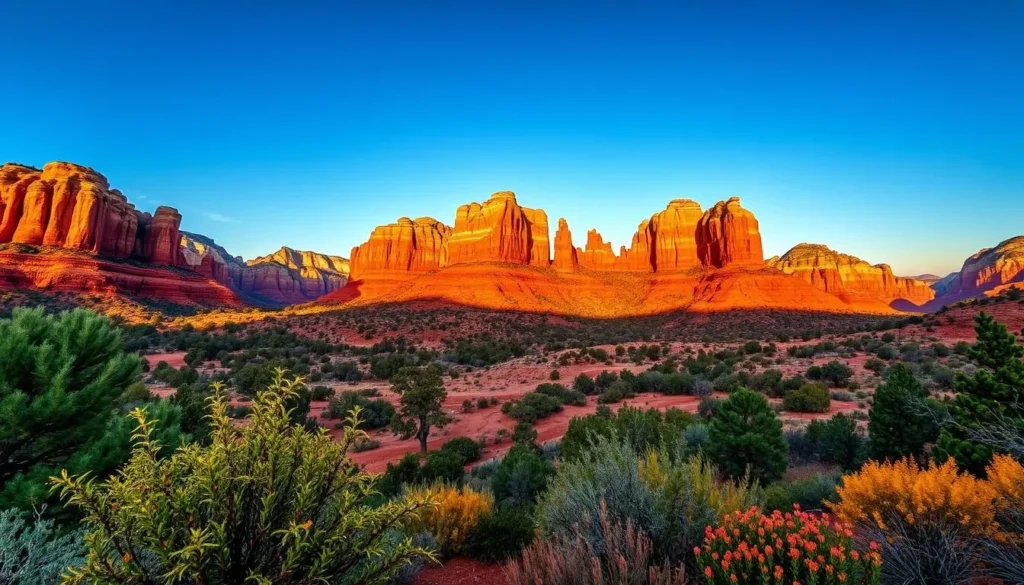
Must-Do Hikes: Devil’s Bridge and Cathedral Rock
Sedona is a hiker’s paradise, offering trails that cater to all skill levels. Two must-do hikes include Devil’s Bridge and Cathedral Rock. Devil’s Bridge Trail, a 4.2-mile round trip, leads to Sedona’s largest natural sandstone arch, offering an iconic photo opportunity. Make sure to arrive early to avoid crowds, especially during peak season.
Cathedral Rock, another must-do hike, is a moderately challenging 1.2-mile round trip climb that rewards hikers with panoramic views of the surrounding red rock country. This hike is a great way to experience Sedona’s natural beauty up close.
Exploring Sedona’s Spiritual Vortexes
Sedona is known for its vortexes, areas believed to facilitate meditation, healing, and spiritual awakening. The most accessible vortexes are located at Airport Mesa, Cathedral Rock, Bell Rock, and Boynton Canyon. Visitors can explore these sites on their own or book a guided day trip to enhance their experience.
Tlaquepaque Arts and Shopping Village
After enjoying the outdoors, visit Tlaquepaque Arts and Shopping Village, an authentically recreated Mexican village. This charming town is filled with art galleries, boutiques, and restaurants, offering a unique cultural experience. Take your time to explore the area and enjoy the local craftsmanship.
To fully appreciate Sedona’s beauty, make sure to drive the Red Rock Scenic Byway (Highway 179), often referred to as “a museum without walls.” This scenic drive offers breathtaking views of Sedona’s famous red rock formations without leaving your car, making it a perfect way to spend your trip.
Monument Valley: Icon of the American Southwest
![]()
The breathtaking vistas of Monument Valley have captivated travelers for decades, making it a quintessential stop on any Arizona adventure. This 92,000-acre Tribal Park, owned and operated by the Navajo Nation, straddles the Arizona-Utah border and is renowned for its vast red landscape and unique rock formations.
Scenic Drive Through Navajo Nation
The 17-mile scenic loop drive through Monument Valley is an unforgettable experience, taking you through some of the most breathtaking landscapes in the American Southwest. As you drive along the bumpy dirt road, you’ll be surrounded by the valley’s most famous formations, including the Mittens, Three Sisters, and John Ford’s Point.
Guided Tours to Experience Navajo Culture
While the self-drive option is popular, booking a Navajo-guided tour provides a much richer experience. Local guides share cultural insights, historical knowledge, and access to restricted backcountry areas, giving you a deeper understanding of the land and its people. You’ll learn about the Navajo people’s deep connection to the area and their traditions, making your visit to Monument Valley even more meaningful.
As you explore Monument Valley, be sure to visit the visitor center, which offers educational exhibits about Navajo culture and history, as well as a restaurant serving traditional Navajo cuisine. Whether you’re interested in history, culture, or simply taking in the stunning views, Monument Valley is a must-visit destination on your Arizona trip.
Antelope Canyon and Page: Nature’s Masterpieces
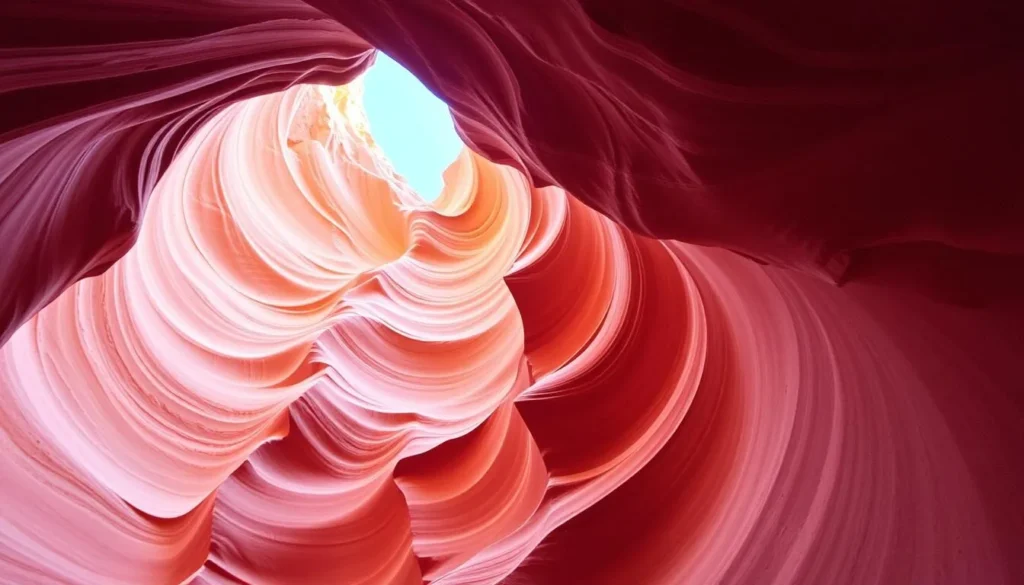
Antelope Canyon, located in Page, Arizona, is a masterpiece of nature, carved by the forces of erosion over thousands of years. This slot canyon is renowned for its smooth, flowing sandstone walls that seem to defy reality.
The area around Page is home to several such natural wonders, making it a must-visit destination for anyone traveling through the Southwest. The Colorado River, which runs through the Glen Canyon, adds to the beauty of this region.
Upper vs. Lower Antelope Canyon
Antelope Canyon is divided into two main sections: Upper Antelope Canyon and Lower Antelope Canyon. Upper Antelope Canyon is wider and more accessible, famous for its light beams that pierce through the openings in the canyon ceiling between March and October.
Lower Antelope Canyon, on the other hand, is narrower and requires navigating stairs and ladders. While it doesn’t have the famous light beams, it’s generally less crowded and offers equally stunning wave-like formations at a lower price point.
Horseshoe Bend: The Perfect Complement
Just a few miles from Antelope Canyon lies Horseshoe Bend, one of the most spectacular views of the Colorado River as it makes a 270-degree turn around a sandstone escarpment. The overlook is accessible via a 1.5-mile round-trip hike from the parking area.
Lake Powell Adventures
Lake Powell, part of the Glen Canyon National Recreation Area, offers a myriad of adventures including houseboating, kayaking, swimming, and exploring hidden canyons and beaches along its 1,960 miles of shoreline.
Formed by the completion of Glen Canyon Dam in 1963, Lake Powell is a man-made reservoir on the Colorado River that attracts over 2 million visitors per year.
Arizona, United States: Best Things to Do in National Parks
From the Sonoran Desert to the Painted Desert, Arizona’s national parks are a treasure trove of natural wonders. You can explore the state’s incredible geological and cultural diversity by visiting some of its most remarkable national parks.
Saguaro National Park: Desert Giants
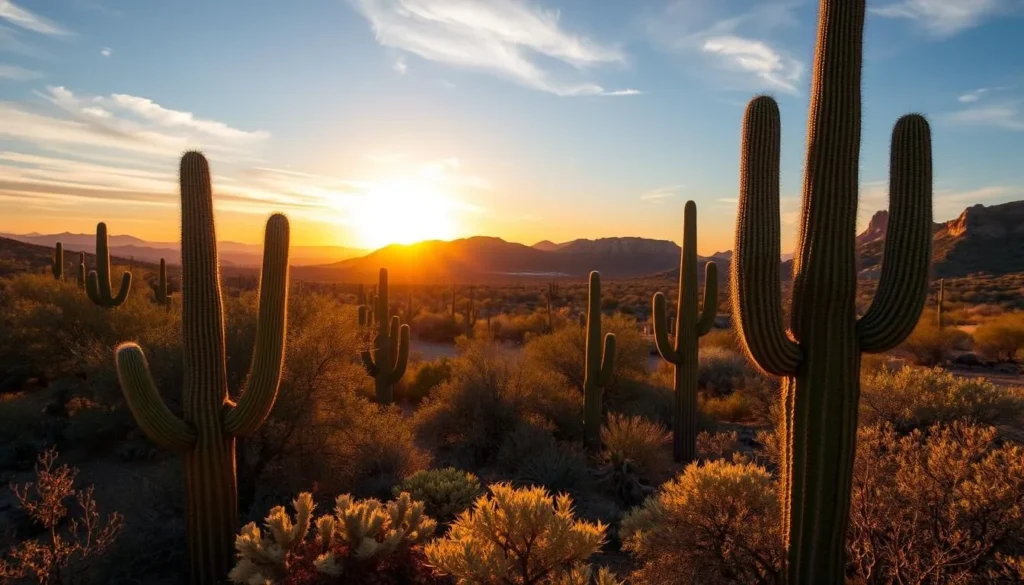
Saguaro National Park is divided into two districts by the city of Tucson. The eastern district, known as the Rincon Mountain District, offers more hiking trails and mountain scenery. In contrast, the western district, or Tucson Mountain District, features a higher density of saguaro cacti. You can enjoy scenic drives through both districts, taking in the breathtaking views of these giant cacti, which can grow up to 60 feet tall and live for 200 years in the Sonoran Desert.
Petrified Forest and Painted Desert
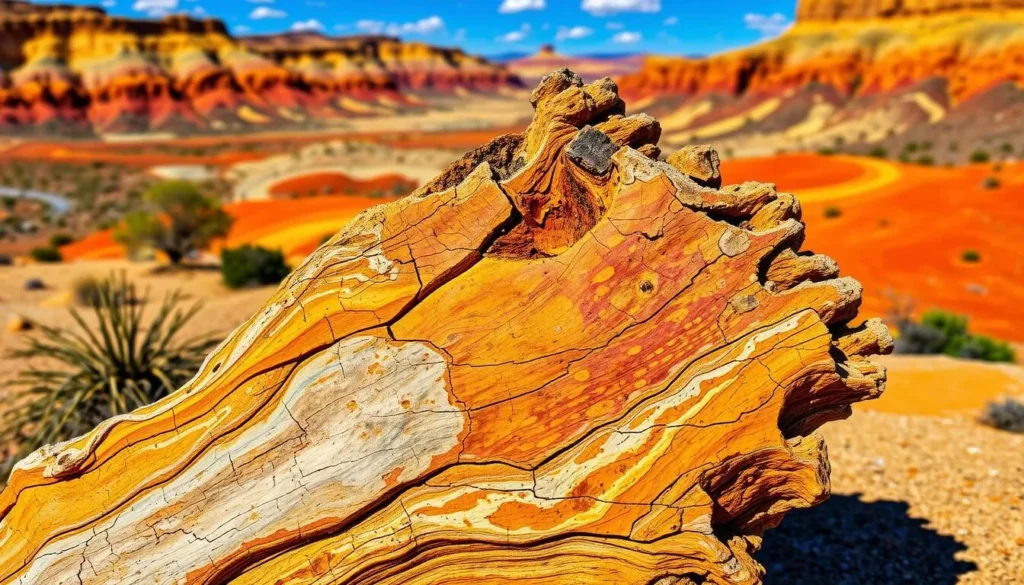
Petrified Forest National Park is located in northeastern Arizona and is home to the world’s largest and most colorful concentrations of petrified wood. The park also features the stunning Painted Desert, with its vibrant hues of red, orange, pink, purple, and blue sedimentary layers. You can explore the park’s many scenic vistas, fossil displays, and unique landscapes, making it a fascinating destination for anyone interested in geology and natural history.
Canyon de Chelly National Monument
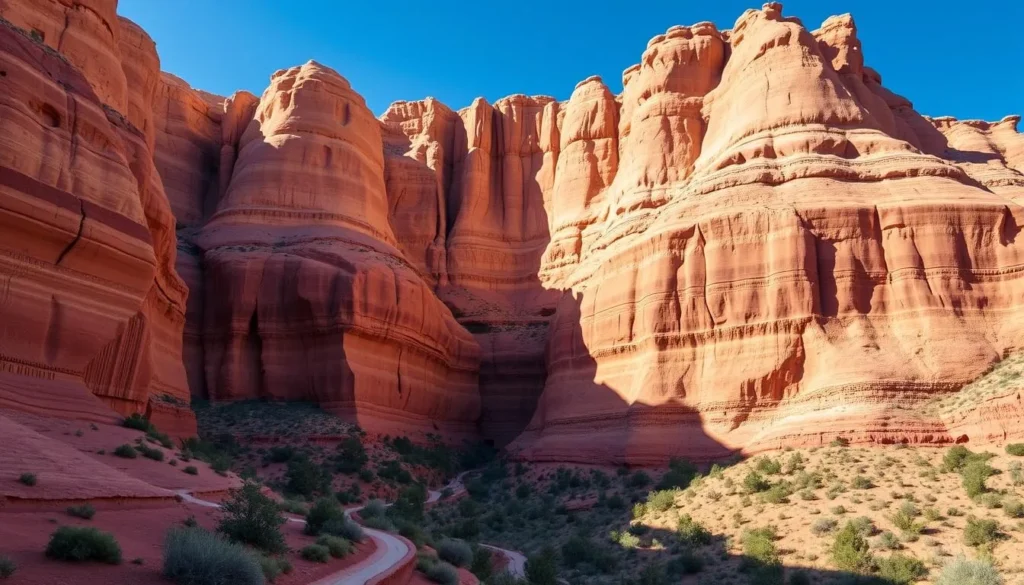
Canyon de Chelly National Monument is situated on Navajo land and features spectacular sandstone cliffs, ancient cliff dwellings, and rock art spanning thousands of years of human habitation. Unlike most national monuments, Canyon de Chelly is still home to Navajo families who farm and raise livestock in the canyon, creating a unique blend of protected landscape and living cultural heritage. You can explore the monument’s rich cultural history and experience the natural beauty of this remarkable site.
Havasu Falls: Turquoise Paradise
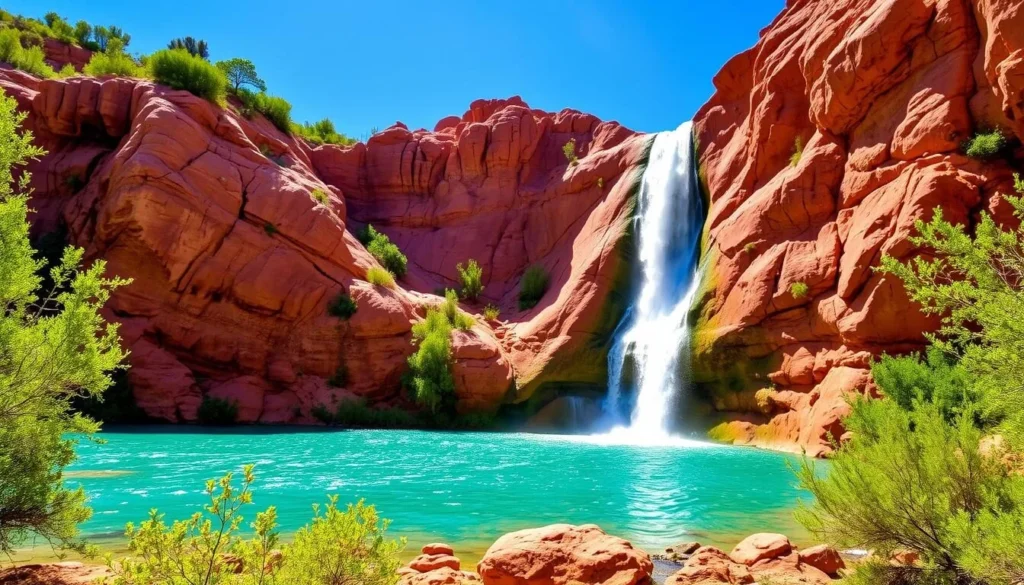
Located within the Havasupai Indian Reservation, Havasu Falls is a true bucket list adventure that demands preparation and perseverance. The Havasupai Indian Reservation features five waterfalls located in the southwest corner of the Grand Canyon, making it a unique and breathtaking destination.
Securing the Coveted Permit
Securing a permit is the first challenge you will face when planning your trip to Havasu Falls. The Havasupai Tribe releases permits for the entire year on February 1st, and they typically sell out within hours. To increase your chances, make sure to plan ahead and be prepared to secure your permit as soon as they become available. This is a challenging task, but with the right planning, you can make your way to this incredible destination.
Preparing for the Hike to Havasupai
The journey to Havasu Falls involves a challenging 10-mile hike (one way) from the Hualapai Hilltop trailhead, descending 2,000 feet into the canyon. To prepare for this hike, you should carry sufficient water, wear appropriate footwear, and be prepared for extreme heat during summer months. Most visitors stay 3-4 days at the campground or lodge in Supai Village to explore all five waterfalls in the area. It’s essential to respect tribal regulations and leave no trace, as this is not only a natural wonder but a sacred place for the Havasupai people.
By understanding the requirements for visiting Havasu Falls and preparing accordingly, you can ensure a successful and enjoyable trip to this incredible destination. With its stunning turquoise waters and rich cultural heritage, Havasu Falls is an experience you will never forget, making it a great addition to your bucket list.
Urban Adventures in Phoenix and Scottsdale
As you explore Arizona, a visit to Phoenix and Scottsdale offers a refreshing urban counterpoint to the state’s natural wonders. These vibrant cities are known for their world-class dining, shopping, and cultural attractions, all set against the stunning backdrop of the Sonoran Desert.
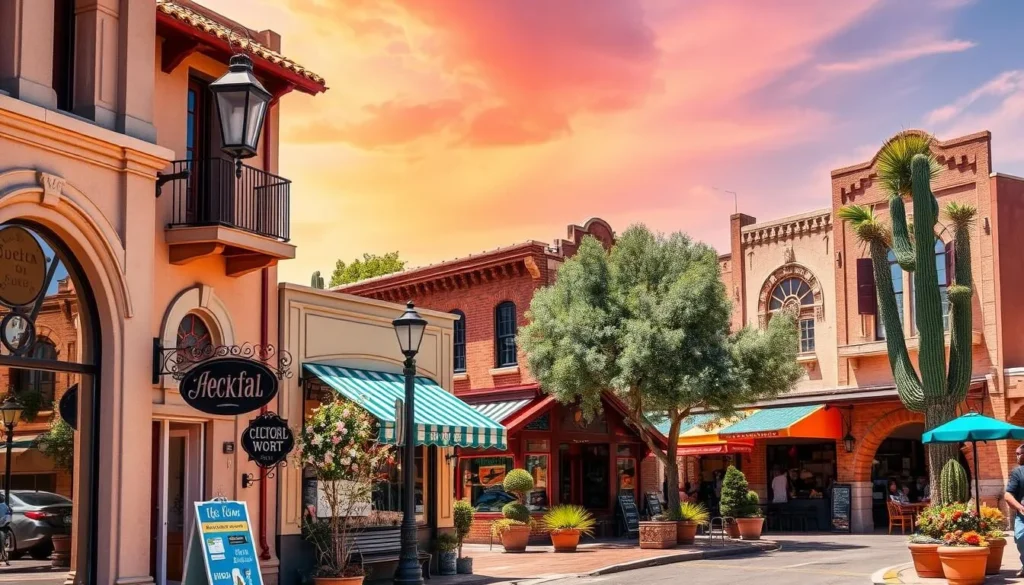
Old Town Scottsdale’s Charm
Old Town Scottsdale charms visitors with its unique blend of Western heritage and contemporary flair. You’ll find art galleries, boutique shops, restaurants, and nightlife all within a walkable district that seamlessly blends historic and modern elements. Stroll through the streets and discover the perfect blend of Southwestern charm and urban sophistication.
Desert Botanical Garden and Cultural Attractions
The Desert Botanical Garden is a must-visit, showcasing the incredible biodiversity of the Sonoran Desert with over 50,000 plants, including rare and endangered species. Seasonal exhibits and nighttime light installations add to the garden’s allure. For art enthusiasts, the Phoenix Art Museum and Heard Museum provide cultural experiences that complement the state’s natural beauty, featuring a diverse range of American Indian art and cultural exhibits.
Camelback Mountain Hike
For outdoor enthusiasts, Camelback Mountain offers a challenging hike with breathtaking rewards. Choose between the Echo Canyon Trail (1.2 miles) or Cholla Trail (1.5 miles), both of which offer strenuous climbs to panoramic views of the Phoenix metropolitan area. The hike is a great way to experience the natural beauty of Arizona’s desert landscapes while enjoying the urban views.
Whether you’re interested in culture, outdoor adventures, or simply relaxing in a vibrant city, Phoenix and Scottsdale have something for everyone. From luxury resorts and day spas to spring training baseball games and professional sports teams, the list of things to do is extensive and exciting.
Historic Towns and Cultural Experiences
From mining towns to ancient pueblos, Arizona’s historic towns offer a unique cultural experience. You can explore the state’s rich heritage by visiting these towns, each with its own story to tell.
Bisbee: Quirky Mining Town Turned Artist Haven
Bisbee is a must-visit destination for anyone interested in the supernatural. This old mining town has transformed into a thriving artist community, with quirky streets that have stayed true to their Old West heritage. You can explore the antique shops, enjoy Western vibes, and savor all-American diner fare. Don’t miss a visit to the nearby town of Lowell for vintage vibes and a stroll down the Broadway Stairs off Brewery Gulch.
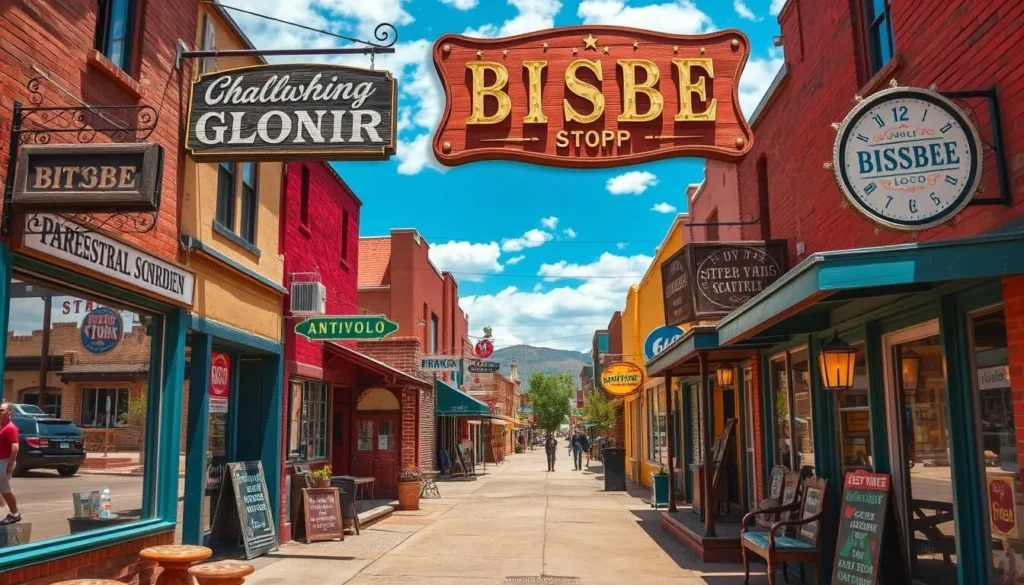
Tombstone: The Town Too Tough to Die
Just a short drive from Bisbee, Tombstone is another old mining town that has been restored to its former glory. This town is rich in old west history and cultural storytelling, with daily gunfight reenactments at the O.K. Corral and historic saloons to explore. You can stroll down Allen Street, the main drag, and experience life in the 1880s.
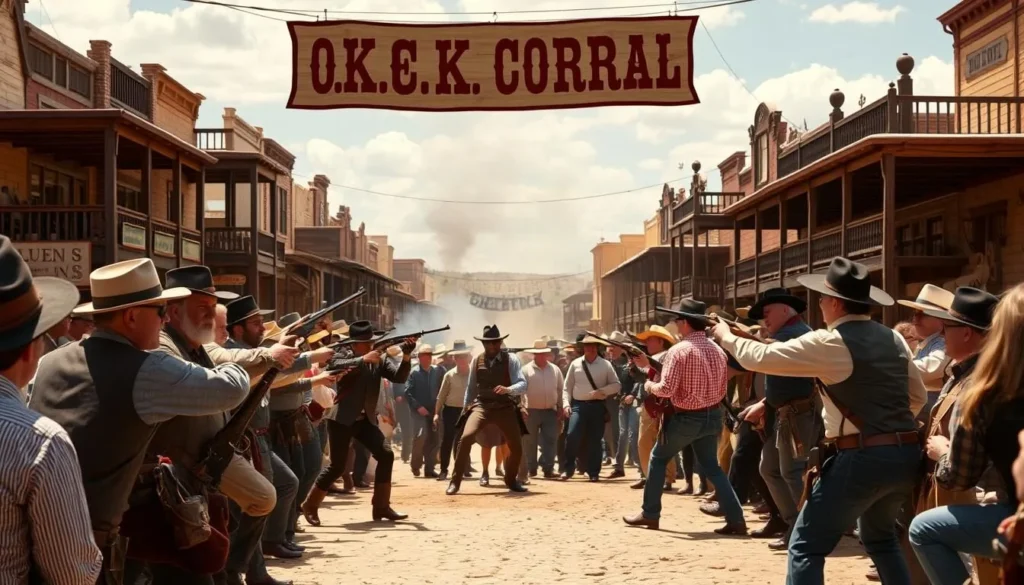
Taos Pueblo and Indigenous Heritage Sites
For a truly unique cultural experience, visit Taos Pueblo in northern New Mexico. This UNESCO World Heritage site is home to an ancient pueblo and is still a living, working community. You can explore the pueblo and learn about the history and traditions of the indigenous people who still live there.
Arizona’s historic towns are a great addition to any bucket list, offering a fascinating glimpse into the state’s rich past. You can explore the area, take a day trip, and experience the unique culture and history that these towns have to offer.
Outdoor Adventures Beyond Hiking
Arizona’s landscape is a playground for outdoor enthusiasts, with plenty of exciting activities to enjoy beyond hiking. While trails abound, the state’s diverse terrain invites you to explore in different ways.
Rafting the Colorado River
Rafting the Colorado River through the Grand Canyon offers an unparalleled adventure, with trips ranging from one-day floats to epic 21-day journeys covering the entire 277-mile canyon stretch. You can experience thrilling whitewater rapids, peaceful floating sections, and side canyon hikes to hidden waterfalls, all while camping under star-filled skies.
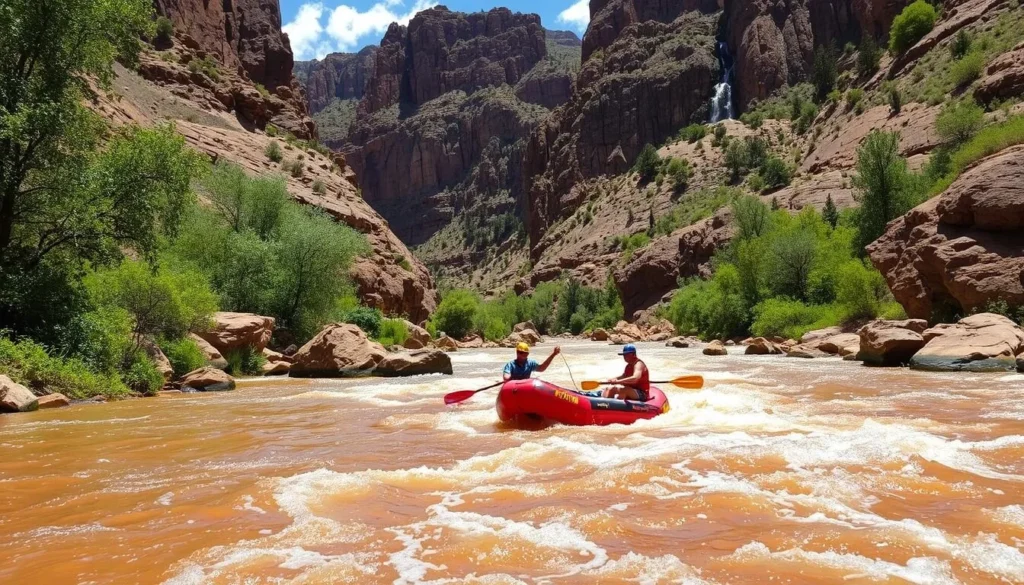
Hot Air Ballooning in the Desert
For a serene and breathtaking experience, consider hot air ballooning over the Sonoran Desert near Phoenix or Scottsdale. Sunrise flights offer stunning views of saguaro cacti, mountain ranges, and desert wildlife. Time your visit to coincide with the Albuquerque International Balloon Fiesta for a truly magical experience.
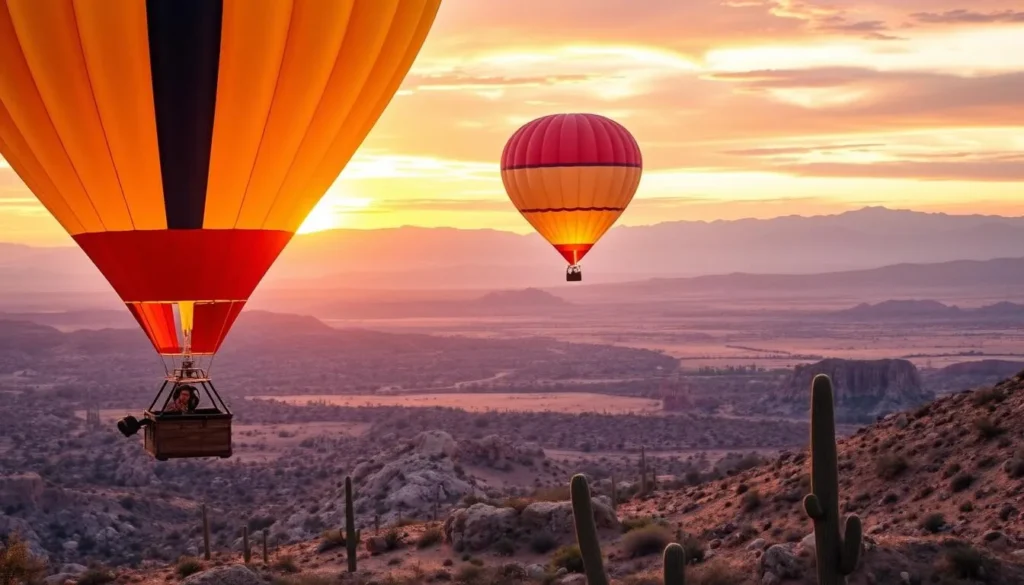
Stargazing in Arizona’s Dark Skies
Arizona’s clear air and minimal light pollution make it a premier destination for stargazing. Visit designated International Dark Sky Parks like the Grand Canyon, Petrified Forest, and Tumacácori National Historical Park to witness the night sky in all its glory.
Other adventure options in Arizona include mountain biking in Sedona, rock climbing at Queen Creek Canyon, horseback riding through Monument Valley, and off-roading in the Sonoran Desert. With so many ways to experience the state’s diverse terrain, you’re sure to find the perfect adventure to add to your bucket list.
Hidden Gems of Arizona
For those willing to venture off the beaten path, Arizona reveals a collection of hidden gems that showcase the state’s diverse natural beauty and quirky charm. These lesser-known destinations offer a chance to experience the authentic Arizona, away from the crowds.
The Wave at Vermillion Cliffs
The Wave, located within the Vermilion Cliffs National Monument, is a breathtaking sandstone formation that has gained popularity due to its unique, wavy pattern. To visit, you’ll need to enter a permit lottery system, as only 64 people are allowed to access this area daily.
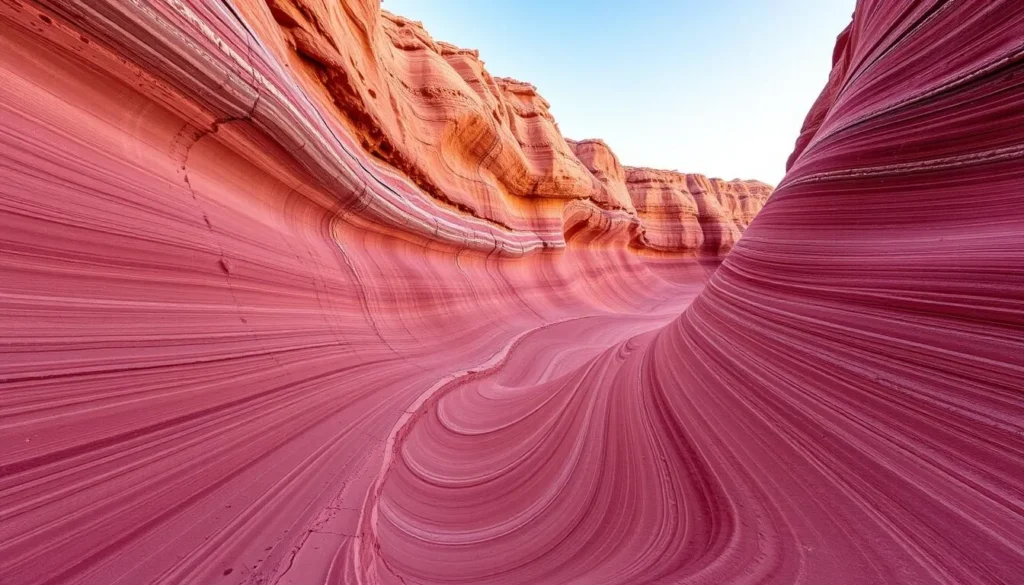
Arcosanti: Experimental Desert Town
Arcosanti is an experimental town in Arizona’s high desert, founded by architect Paolo Soleri. This prototype arcology integrates architectural design with ecology, aiming to minimize environmental footprint. Visitors can take guided tours to explore this unique community’s sustainable design principles.
Glen Canyon National Recreation Area
Glen Canyon National Recreation Area spans over 1.25 million acres around Lake Powell, offering a range of outdoor activities such as houseboating, kayaking, and hiking. Visitors can explore notable attractions like Glen Canyon Dam, Reflection Canyon, and Rainbow Bridge National Monument.
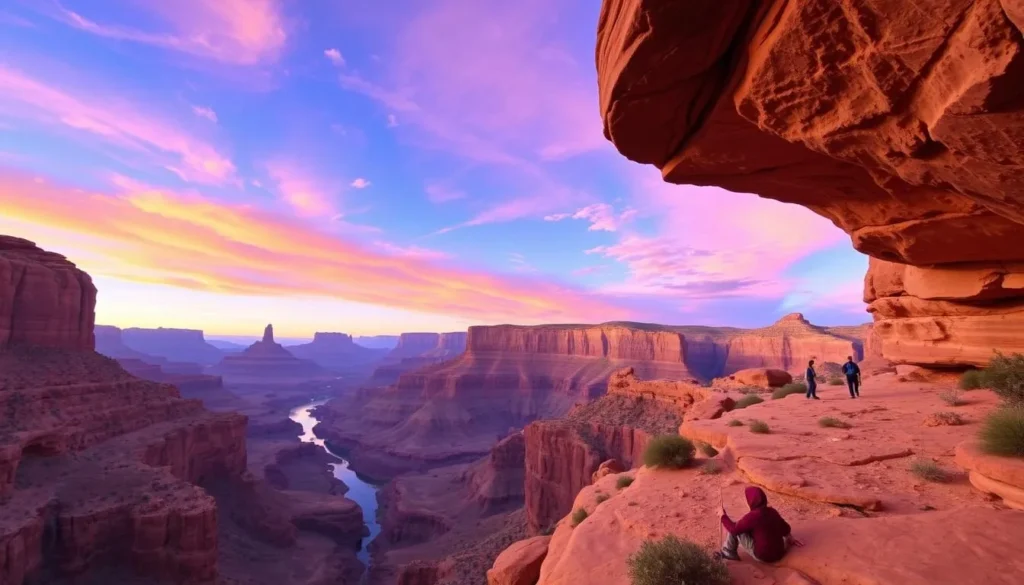
These hidden gems offer a glimpse into Arizona’s diverse natural beauty and unique cultural experiences, making them a must-visit for any traveler looking to explore beyond the usual tourist destinations.
Road Trip Routes Through Arizona
Arizona’s diverse landscapes make it a paradise for road trippers, with numerous iconic routes that promise unforgettable adventures. Whether you’re a nature lover, history buff, or simply looking for a thrilling drive, Arizona has something for everyone.
Historic Route 66 Experience
Historic Route 66, often referred to as the “Mother Road,” spans 385 miles through Arizona, offering a nostalgic journey through quaint towns like Kingman, Seligman, Williams, and Winslow. Be sure to stop at landmarks like the Wigwam Motel in Holbrook, the famous statue in Winslow, and the historic Hackberry General Store.
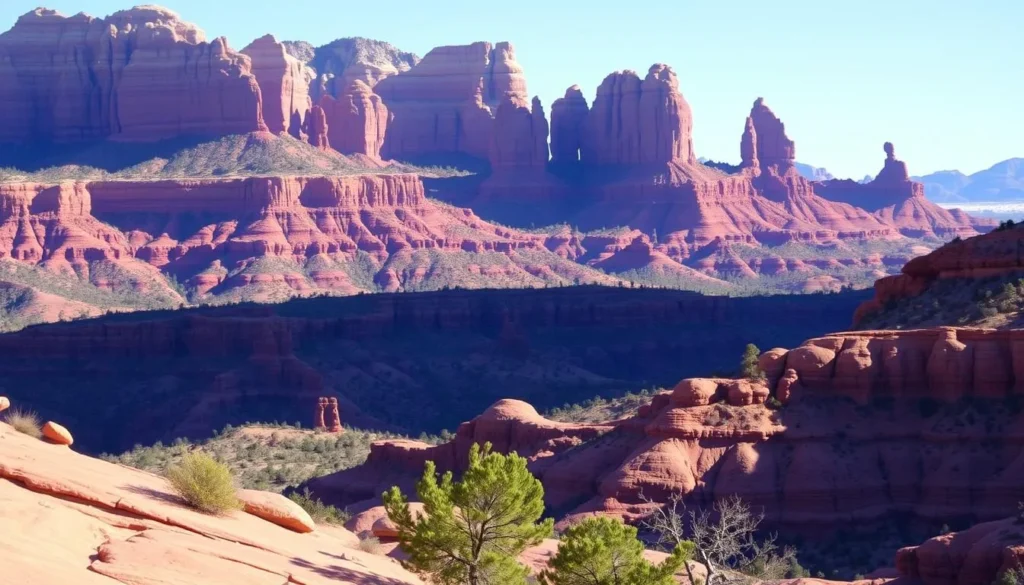
Red Rock Scenic Byway
The Red Rock Scenic Byway (Highway 179) is a 14.5-mile drive that packs in some of Sedona’s most breathtaking views. With numerous pullouts for photography and trailheads for hiking, this route is a must for anyone visiting Sedona. The contrast between the red rock formations and the blue sky is truly breathtaking.
Monument Valley Scenic Road
Monument Valley Scenic Road offers a 17-mile self-drive loop through Navajo Nation land, passing iconic formations like the Mittens, Three Sisters, and John Ford’s Point. Although the unpaved road can be rough, it’s manageable in most passenger vehicles. Don’t forget to follow the free map to explore the 11 attractions along the way.
For a comprehensive Arizona experience, consider a 300-mile loop from Phoenix through Sedona, Flagstaff, the Grand Canyon, and back. This route hits many of the state’s highlights in a manageable 4-7 day trip, making it an ideal way to experience the best of Arizona.
Wellness and Relaxation in the Desert
Unwind in Arizona, where the desert’s tranquility meets luxurious wellness retreats. You can rejuvenate your mind, body, and spirit in the state’s serene landscapes.
Scottsdale’s Luxury Spa Resorts
Scottsdale is renowned for its high-end spas and wellness resorts, offering treatments that incorporate indigenous ingredients like prickly pear and desert sage. Top resorts include:
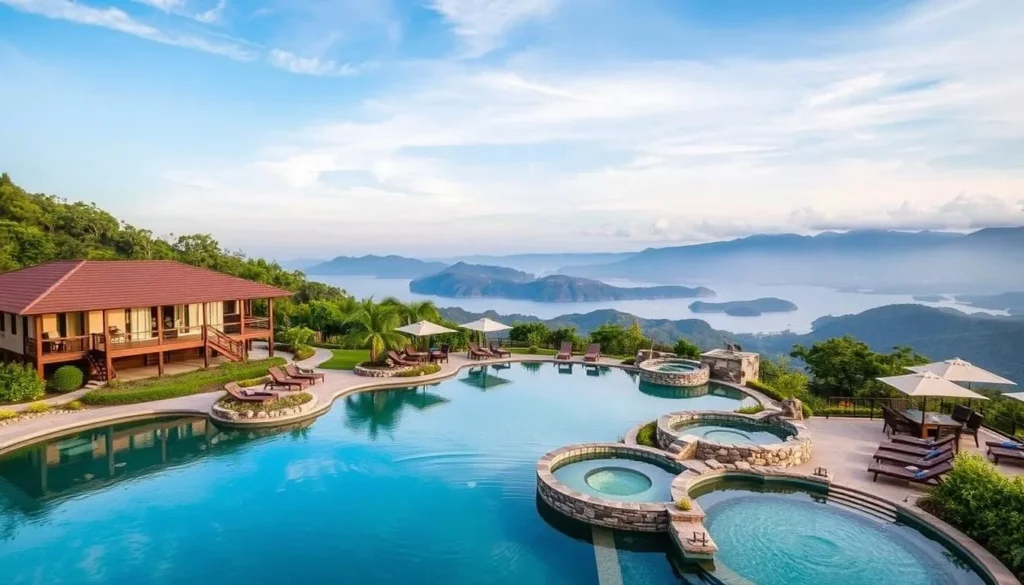
Natural Hot Springs and Healing Waters
Arizona is home to numerous natural hot springs, where you can soak in mineral-rich waters. Visit Desert View Hot Springs near Safford or hike to Arizona Hot Springs in the Lake Mead National Recreation Area for a unique experience.
The red rock energy of Sedona adds another dimension to wellness travel, with numerous spas and retreat centers offering meditation sessions and spiritual practices. Time your visit during a new moon to enjoy Arizona’s dark skies and stargazing, a meditative practice that reduces stress and promotes mindfulness.
Whether you’re looking to relax in a luxurious spa or connect with nature, Arizona offers a diverse range of wellness experiences. Take a day trip to explore the area around your chosen resort, or spend a list of days discovering the many places Arizona has to offer.
Planning Your Perfect Arizona Adventure
To make the most of your Arizona adventure, understanding the state’s seasonal variations is key. Arizona is a year-round destination, but the experience varies greatly depending on the time of year and where you are in the state.
Spring (March to May) and fall (September to November) are considered the best times to visit, offering pleasant temperatures across the state. Spring brings the beautiful wildflower blooms, including the iconic Saguaro cacti blossoms, while fall showcases vibrant foliage in the northern mountains.
In contrast, summer can be extremely hot in desert regions like Phoenix and Tucson, with temperatures often exceeding 100°F (38°C). However, higher-elevation areas such as Flagstaff and the Grand Canyon’s North Rim remain comfortable for exploration.
For those planning to visit multiple national parks or monuments, consider purchasing an America the Beautiful Pass ($80), which covers entrance fees to all federal recreation sites for a full year. It’s also crucial to book accommodations and permits well in advance, especially for popular destinations.
Creating a realistic itinerary that accounts for driving distances is essential, as Arizona is the sixth-largest state in the US. Focus on a regional approach to make the most of your trip and enjoy the diverse places Arizona has to offer, checking off items from your bucket list.
By planning carefully, you can have a memorable Arizona adventure, exploring the Grand Canyon, experiencing the natural beauty of the state, and enjoying the many things to do in this incredible destination.
